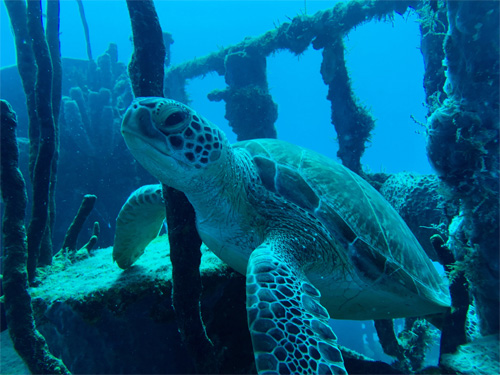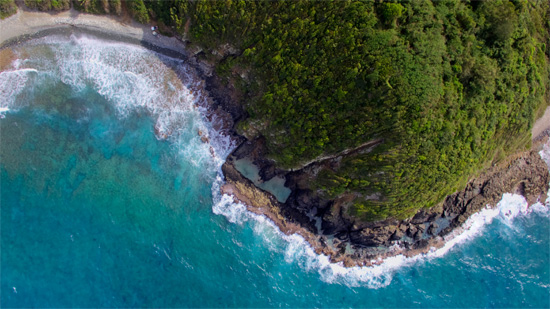
Photo credit: Thewrightsights
Several years ago, my uncle, Gerry Doward, took me on a hike to Willis Bay and Sweet Bottom Bay. I suspect he was trying to kill me, and he almost succeeded. I returned home frazzled and without soles on my shoes; the sharp, jagged rocks along the way tore them off.
My uncle is a former detective and a history enthusiast. He’s also fairly proficient in the art of “pounding melee” (gossip). Some time ago he called to say that his sweetheart, Karen, a prominent and seemingly well-balanced Virgin Islander, fell out of bed and onto the floor.
I was glad he told me. How and why Karen tumbled out of bed is indeed puzzling. And I’m concerned that this might be the start of some bizarre trend. If so, it is worthy of serious study, not only by anthropologists, but by highly trained experts in the fields of applied physics, chaos theory and Caribbean metaphysics. But let’s get back to the issue at hand.
Willis Bay and Sweet Bottom Bay are located along the northwestern coast of St. Croix. This was my first time out here, and I was struck by the strong spiritual and ancestral vibrations I felt along the way. The winding trail we trekked had also been used by slaves. And when I got to Willis Bay, I swam in a pool that had been made by natural rock formations. The water was soothing and warm. I emerged cleansed and revitalized.
I mention this hike for a simple reason. Land is part of our cultural landscape. Somewhere along the northwestern coast of St. Croix is Maroon Ridge — that’s where some slaves leapt to their deaths rather than submit to a life of misery. There’s also a cave called Maroon Hole — slaves hid there before trying to escape to Puerto Rico.
People often sense “vibrations” in this region of St. Croix, says Olasee Davis, one of the Caribbean’s most highly acclaimed ecologists. Davis has led thousands up and down trails throughout the U.S. Virgin Islands. “This land is sacred,” he says, “it needs to be protected.” Davis is also a scientist, and it pains him to see how ecologically illiterate we’ve become.
By looking at the skies, he says, our ancestors, could tell when turtles had come ashore to lay eggs. And the blooming of the flamboyant flowers was always a sure sign that hurricane season had arrived.
But the new millennium has found humankind ignorant and arrogant. It never occurs to us that ants might be worthy of our attention. And few people realize that termites play a crucial role in our ecosystem. We are not the lords of creation; we are merely woven into nature’s vast fabric. And so, who are we to question which beings among us are fit to live or die?
Consider: “If insects were to disappear, humanity probably could not last more than a few months. Most of the amphibians, reptiles, birds and mammals would crash to extinction about the same time. Next would go the bulk of flowering plants and other terrestrial habitats of the world, and the land surface would literally rot.”[1]

Photo credit: Dondre Richards
Consider: “Lightning strikes the earth one hundred times every second, more than eight and a half million times a year. As harmful as lightning can be, its absence would mean the speedy and total destruction of life on this planet. In less than an hour, the Earth would lose to the upper atmosphere, the negative electrical charge that enables it to convert atmospheric nitrogen into nitrogen, which almost all plants require. Without plants there would be no animal life.”[2]
Consider: “If there are no mangrove forests, then the sea will have no meaning. It is like having a tree with no roots, for the mangroves are the roots of the sea.”[3]
Olasee Davis considers these things. And that’s why he describes his job as a “painful” one. This PhD. Candidate holds degrees in ecology, agronomy, chemistry, psychology and agribusiness, and for more than a decade Davis has sought to raise public awareness about issues that are crucial to our survival. Besides his full time job at the University of the Virgin Islands’ Cooperative Extension Service, Davis is involved with 18 non-profit organizations. He also teaches part-time, writes a column for two local newspapers and is a frequent guest on talk shows.
But even this stalwart soul realizes he can only do so much. So he slips away frequently into the realm of spirits — and appeals to a Higher Force to show us the way.
Note: For an enlightening lecture tour of the Virgin Islands, contact Olasee Davis at 340-692-4053 or e-mail him at: odavis@uvi.edu .
[1] Nettle, Daniel and Romaine Suzanne (2000). Vanishing Voices.
[2] Patterson, Freeman (1989). Photography of Natural Things.
[3] Quote from an anonymous fisherman from Southern Thailand.
